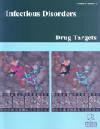-
oa Editorial [Hot Topic: B Lymphocytes as Programmers and Effectors of Immunity, their Roles Beyond Antibody Production (Guest Editor: Simon Fillatreau)]
- Source: Infectious Disorders - Drug Targets (Formerly Current Drug Targets - Infectious Disorders), Volume 12, Issue 3, Jun 2012, p. 179 - 180
-
- 01 Jun 2012
- Previous Article
- Table of Contents
- Next Article
Abstract
B lymphocytes provide essential protection against infections, and also act as drivers of pathogenesis in some autoimmune diseases. During the recent years, major progress has been made in our understanding of the molecular mechanisms controlling B cell activation, and several novel functions of B cells independent of antibody production have been discovered. The aim of this volume is to present some of these novel findings, with articles on how BCR co-receptors shape B cell responses, how B cells regulate T and innate cells, and how local B cell responses outside of lymphoid organs contribute to frontline immunity. In addition, one review highlights the role of B cells as phagocytes in fish and mammals, and two articles discuss the possibility of using activated B cells for suppressing unwanted immune reactions in adoptive therapy. Altogether, these articles provide an integrated view of B cell responses in the immune system, highlighting their interactive lifestyle, and poly-functionality. Antigen-specific B cell responses start with the recognition of antigen by BCR. Tsubata reviews how BCR co-receptors regulate B cell activation by antigen, with a special focus on CD22 and Fc receptors (1). The cytoplasmic regions of these coreceptors contain immunoreceptor tyrosine-based inhibition motifs (ITIMs), which can recruit phosphatases and inhibit BCR signaling upon engagement. These co-receptors offer multiple possibilities for regulating B cell sensitivity to antigen. For instance, CD22 provides stronger suppression when antigens contain sialic acids, a type of glycan moiety that is abundantly expressed in animals but rarely found in microbes. Thus, CD22 might act as a sensor for self-associated glycosylation patterns, to selectively prevent immunity against autoantigens. Noteworthily, B cells can adjust in a cell-autonomous manner the inhibitory activity of CD22 by modulating the glycosylation pattern of this receptor itself. B cells might therefore change their sensitivity for antigen according to their metabolic status. These new findings are of great interest given the importance of these coreceptors in regulation of immunity in vivo. Polymorphisms in the genes coding for these co-receptors have been associated with increased susceptibility to autoimmune pathologies such as systemic lupus erythematosus (SLE) in human. This link is not fully explained mechanistically but it might involve expression of pathogenic antibody-dependent and -independent functions by B cells....


